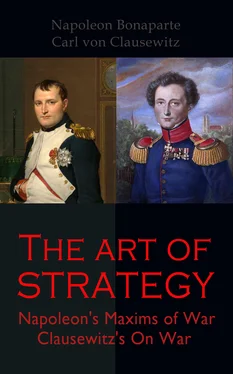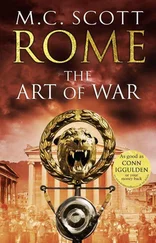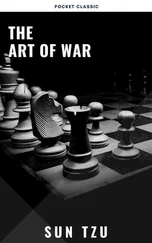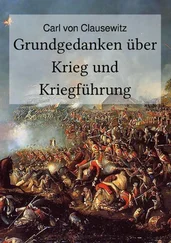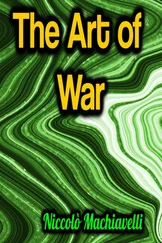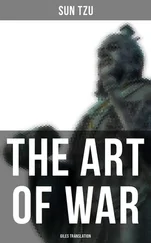To add to all this, compassion strikes the beating heart with pity at the sight of the maimed and fallen. The young soldier cannot reach any of these different strata of danger without feeling that the light of reason does not move here in the same medium, that it is not refracted in the same manner as in speculative contemplation. Indeed, he must be a very extraordinary man who, under these impressions for the first time, does not lose the power of making any instantaneous decisions. It is true that habit soon blunts such impressions; in half in hour we begin to be more or less indifferent to all that is going on around us: but an ordinary character never attains to complete coolness and the natural elasticity of mind; and so we perceive that here again ordinary qualities will not suffice—a thing which gains truth, the wider the sphere of activity which is to be filled. Enthusiastic, stoical, natural bravery, great ambition, or also long familiarity with danger—much of all this there must be if all the effects produced in this resistant medium are not to fall far short of that which in the student’s chamber may appear only the ordinary standard.
Danger in War belongs to its friction; a correct idea of its influence is necessary for truth of perception, and therefore it is brought under notice here.
CHAPTER V.
Of Bodily Exertion in War
Table of Contents
If no one were allowed to pass an opinion on the events of War, except at a moment when he is benumbed by frost, sinking from heat and thirst, or dying with hunger and fatigue, we should certainly have fewer judgments correct objectively; but they would be so, subjectively , at least; that is, they would contain in themselves the exact relation between the person giving the judgment and the object. We can perceive this by observing how modestly subdued, even spiritless and desponding, is the opinion passed upon the results of untoward events by those who have been eye-witnesses, but especially if they have been parties concerned. This is, according to our view, a criterion of the influence which bodily fatigue exercises, and of the allowance to be made for it in matters of opinion.
Amongst the many things in War for which no tariff can be fixed, bodily effort may be specially reckoned. Provided there is no waste, it is a coefficient of all the forces, and no one can tell exactly to what extent it may be carried. But what is remarkable is, that just as only a strong arm enables the archer to stretch the bowstring to the utmost extent, so also in War it is only by means of a great directing spirit that we can expect the full power latent in the troops to be developed. For it is one thing if an Army, in consequence of great misfortunes, surrounded with danger, falls all to pieces like a wall that has been thrown down, and can only find safety in the utmost exertion of its bodily strength; it is another thing entirely when a victorious Army, drawn on by proud feelings only, is conducted at the will of its Chief. The same effort which in the one case might at most excite our pity must in the other call forth our admiration, because it is much more difficult to sustain.
By this comes to light for the inexperienced eye one of those things which put fetters in the dark, as it were, on the action of the mind, and wear out in secret the powers of the soul.
Although here the question is strictly only respecting the extreme effort required by a Commander from his Army, by a leader from his followers, therefore of the spirit to demand it and of the art of getting it, still the personal physical exertion of Generals and of the Chief Commander must not be overlooked. Having brought the analysis of War conscientiously up to this point, we could not but take account also of the weight of this small remaining residue.
We have spoken here of bodily effort, chiefly because, like danger, it belongs to the fundamental causes of friction, and because its indefinite quantity makes it like an elastic body, the friction of which is well known to be difficult to calculate.
To check the abuse of these considerations, of such a survey of things which aggravate the difficulties of War, nature has given our judgment a guide in our sensibilities, just as an individual cannot with advantage refer to his personal deficiencies if he is insulted and ill-treated, but may well do so if he has successfully repelled the affront, or has fully revenged it, so no Commander or Army will lessen the impression of a disgraceful defeat by depicting the danger, the distress, the exertions, things which would immensely enhance the glory of a victory. Thus our feeling, which after all is only a higher kind of judgment, forbids us to do what seems an act of justice to which our judgment would be inclined.
CHAPTER VI.
Information in War
Table of Contents
By the word “information” we denote all the knowledge which we have of the enemy and his country; therefore, in fact, the foundation of all our ideas and actions. Let us just consider the nature of this foundation, its want of trustworthiness, its changefulness, and we shall soon feel what a dangerous edifice War is, how easily it may fall to pieces and bury us in its ruins. For although it is a maxim in all books that we should trust only certain information, that we must be always suspicious, that is only a miserable book comfort, belonging to that description of knowledge in which writers of systems and compendiums take refuge for want of anything better to say.
Great part of the information obtained in War is contradictory, a still greater part is false, and by far the greatest part is of a doubtful character. What is required of an officer is a certain power of discrimination, which only knowledge of men and things and good judgment can give. The law of probability must be his guide. This is not a trifling difficulty even in respect of the first plans, which can be formed in the chamber outside the real sphere of War, but it is enormously increased when in the thick of War itself one report follows hard upon the heels of another; it is then fortunate if these reports in contradicting each other show a certain balance of probability, and thus themselves call forth a scrutiny. It is much worse for the inexperienced when accident does not render him this service, but one report supports another, confirms it, magnifies it, finishes off the picture with fresh touches of colour, until necessity in urgent haste forces from us a resolution which will soon be discovered to be folly, all those reports having been lies, exaggerations, errors, &c. &c. In a few words, most reports are false, and the timidity of men acts as a multiplier of lies and untruths. As a general rule, every one is more inclined to lend credence to the bad than the good. Every one is inclined to magnify the bad in some measure, and although the alarms which are thus propagated like the waves of the sea subside into themselves, still, like them, without any apparent cause they rise again. Firm in reliance on his own better convictions, the Chief must stand like a rock against which the sea breaks its fury in vain. The rôle is not easy; he who is not by nature of a buoyant disposition, or trained by experience in War, and matured in judgment, may let it be his rule to do violence to his own natural conviction by inclining from the side of fear to that of hope; only by that means will he be able to preserve his balance. This difficulty of seeing things correctly, which is one of the greatest sources of friction in War, makes things appear quite different from what was expected. The impression of the senses is stronger than the force of the ideas resulting from methodical reflection, and this goes so far that no important undertaking was ever yet carried out without the Commander having to subdue new doubts in himself at the time of commencing the execution of his work. Ordinary men who follow the suggestions of others become, therefore, generally undecided on the spot; they think that they have found circumstances different from what they had expected, and this view gains strength by their again yielding to the suggestions of others. But even the man who has made his own plans, when he comes to see things with his own eyes will often think he has done wrong. Firm reliance on self must make him proof against the seeming pressure of the moment; his first conviction will in the end prove true, when the foreground scenery which fate has pushed on to the stage of War, with its accompaniments of terrific objects, is drawn aside and the horizon extended. This is one of the great chasms which separate conception from execution .
Читать дальше
